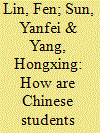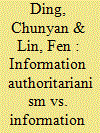|
|
|
Sort Order |
|
|
|
Items / Page
|
|
|
|
|
|
|
| Srl | Item |
| 1 |
ID:
136710


|
|
|
|
|
| Summary/Abstract |
Students have always played an important role in defining the politics of China, and their ideological orientation shapes the nature of student politics. Through a survey of students from six elite universities, this study explores the outlook of Chinese youth’s political identities and analyzes the factors conditioning their identity formation. The results reveal three trends. First, the majority of these college students either claim themselves to be apolitical or to be liberals. Second, among various channels of political (re)socialization, family plays a weak role, while mass media has a strong influence on students’ political orientation. Peking University, the base for nurturing liberals in the 1990s, has now yielded this role to universities specializing in economics and finance, thus suggesting the impact of economic liberalism since the 1990s. Third, gender, education level, academic major, family income, and Communist Party membership are all good indicators of students’ political identities. These results are interpreted in the context of student movements and intellectual transition in China over the past four decades.
|
|
|
|
|
|
|
|
|
|
|
|
|
|
|
|
| 2 |
ID:
177955


|
|
|
|
|
| Summary/Abstract |
Mainland China and Hong Kong are two jurisdictions that, on the one hand, have sharply distinctive information ecosystems despite being one country and, on the other hand, are closely connected with each other in terms of the COVID-19 outbreak and related anti-pandemic measures. This note, through a comparative lens, outlines and compares how the information ecosystem of Mainland China and Hong Kong functioned during the early stage of the outbreak, that is, from 31 December 2019 to 29 February 2020. By tracing and examining the timeline of events and news articles published during the early stage of the outbreak through Wisers Information Database, it demonstrates and conceptualizes the information governance in Mainland China as “information authoritarianism” and that in Hong Kong as “information anarchy.” However, despite different patterns of information governance rooted in the different sociopolitical settings, both information ecosystems suffered from false pandemic information.
|
|
|
|
|
|
|
|
|
|
|
|
|
|
|
|
| 3 |
ID:
153349


|
|
|
|
|
| Summary/Abstract |
Following a well-established research tradition on court decisions, this study analyses 524 defamation cases in China from 1993 to 2013, explores the media's success possibilities, and investigates the role of party capacity, political influence and the medium effect. Contrary to the existing assertions, we find that the media are not necessarily losing. On average, from 1993 to 2013, the success rate of news media in Chinese defamation courts was 42 per cent, and this rate has been increasing since 2005. We also find that government officials and Party organs had consistent advantages in court, while ordinary plaintiffs, magazines and websites had less success. The medium of the media (i.e. print, broadcast, internet) makes a difference, as do the government policies governing the media. In addition, local protectionism exists, but it is less rampant than expected. These findings compel us to rethink the dynamics among the media, the courts and the state, and their implications on China's institutional resilience.
|
|
|
|
|
|
|
|
|
|
|
|
|
|
|
|
| 4 |
ID:
159540


|
|
|
|
|
| Summary/Abstract |
By bridging the news diffusion perspective with collective action studies, this article examines how collective action stories flow between websites and how such diffusion trajectories are shaped by the nature of protests and the institutional features of Chinese media. We first propose a dynamic typology to map China's activism in the digital era within two dimensions: action logic (collective versus connective) and event entrepreneurs (with versus without). We then analyze the news trajectories of three prominent cases and find a strong association between the nature of collective action and state–media interactions. When event entrepreneurs—sympathetic elites such as journalists, lawyers, academics, and netizens—compete to narrate the reality through a protest, political control serves as the dominant mechanism of movement–press dynamics. As activism moves from collective logic toward connective action, the influence of journalistic professionalism on news trajectories can be seen. This study offers a contextualized account to understand the nuanced dynamics between the state, the media, and social movements, and it also presents a framework for analyzing how activism plays out in China in the digital era.
|
|
|
|
|
|
|
|
|
|
|
|
|
|
|
|
| 5 |
ID:
096596


|
|
|
|
|
| Publication |
2010.
|
| Summary/Abstract |
This report presents a portrait of contemporary liberal Chinese journalists. Compared with the national average ten years ago, a typical journalist in Guangzhou is younger, better-educated and more likely to be female, and less likely to be a Communist Party member. The survey shows that the literati value coexists with both the modern professional and Party journalism value during the current journalistic professionalization. Such coexistence results in a complexity in journalists' attitude and behaviour. Journalists tend to be inactively liberal: possessing liberal attitudes but not engaging themselves in action. The survey also reports evidence on the contingency of journalistic behaviour logic. Professional logic shows its popularity when journalists encounter conflicts involving legal, economic and political concerns, but not in cases involving moral or cultural conflicts. Neither professional nor commercial logic is strong enough to oppose political logic when journalists are handling severe political issues.
|
|
|
|
|
|
|
|
|
|
|
|
|
|
|
|
|
|
|
|
|